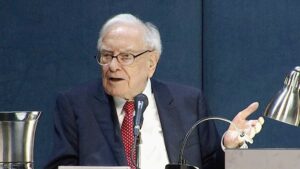Warren Buffett’s Vision: Beyond Degrees
At Extreme Investor Network, we celebrate the wisdom of investing and the insights of legendary financial figures like Warren Buffett. Recently, in his annual letter to shareholders, the CEO of Berkshire Hathaway underlined a refreshing truth in the business world: When it comes to leadership, what really matters is talent and experience, not the prestigious diplomas that often fill corporate boardrooms.
Education: A Tool, Not a Requirement
Buffett has famously stated, "I never look at where a [CEO] candidate has gone to school. Never." His experience has taught him that exceptional leadership often arises from diverse backgrounds, and many successful leaders have thrived without the backing of Ivy League degrees. Instead, he values innate business acumen over traditional educational pedigree.
This perspective is a breath of fresh air in a landscape where startup founders and established executives alike often find themselves tied to their alma mater’s reputation. Buffett’s own educational background, including a bachelor’s degree from the University of Nebraska and a master’s from Columbia, didn’t hinder his belief that potential lies in real-world experience rather than formal education.
The Shift in Educational Value
Buffett’s stance aligns with a broader societal trend. According to Pew Research Center data, nearly half of Americans believe that having a four-year college degree is less essential for high-paying jobs compared to two decades ago. This growing sentiment suggests a shift in how we view education and its role in career success.
Buffett also commemorated remarkable individuals like Ben Rosner, a former Berkshire executive who never progressed beyond the sixth grade. Rosner embraced his entrepreneurial spirit, demonstrating that exceptional business talent can emerge outside the traditional academic system.
Real-World Success Stories: A Broader Perspective
Interestingly, recent statistics reveal that less than 12% of 2023’s Fortune 100 CEOs attended Ivy League schools for their undergraduate degrees, and under 10% hold MBAs from these elite institutions. The future leadership of Berkshire Hathaway, as represented by vice chairman Greg Abel, exemplifies this approach, with Abel being an alumnus of the University of Alberta.
Buffett isn’t alone in this belief. Icons like Mark Cuban and Bill Gates echo similar sentiments. Cuban emphasizes that while college can provide valuable experiences and knowledge, it is not always the ticket to entrepreneurial success. Gates, too, promotes the idea of a well-rounded education and lifelong learning, arguing that there are exceptional cases where forgoing college should be carefully considered—something he himself experienced.
Investing in Yourself: Lifelong Learning
What’s most compelling about Buffett’s philosophy is the emphasis on lifelong learning. He asserts, “I avidly believe in lifelong learning.” It’s a reminder that education can take many forms, from self-study and mentorship to hands-on experiences and networking. At Extreme Investor Network, we encourage our readers to think outside the box when it comes to investing in themselves and their futures.
Education doesn’t have to be confined to a classroom. Rather, it should be a continuous journey of growth and discovery, aligning with your interests and goals.
Takeaway
As you navigate your investment journey, consider what Buffett teaches us: Success is not a straight path defined by degrees but a winding road shaped by experience, curiosity, and the willingness to learn. Strive for personal growth, seek out knowledge in various forms, and remember that true potential often lies beyond traditional expectations.
Stay tuned for more insights and strategies at Extreme Investor Network. Together, let’s redefine what it means to be a successful investor in today’s ever-changing financial landscape.

